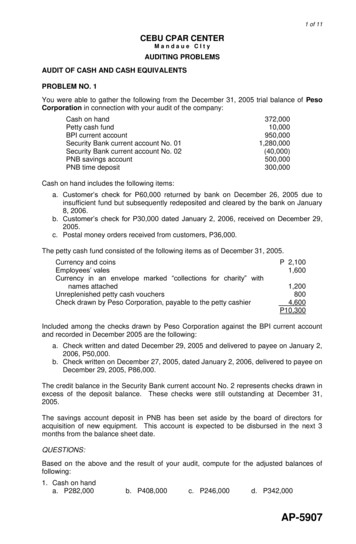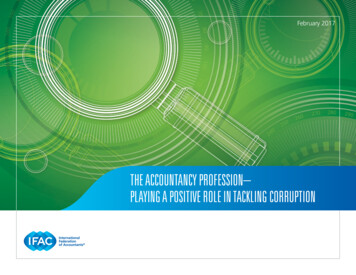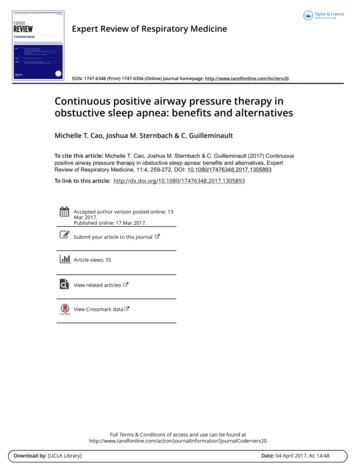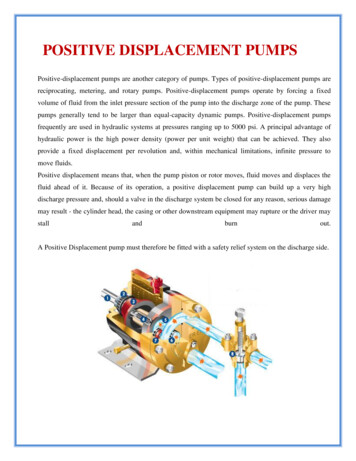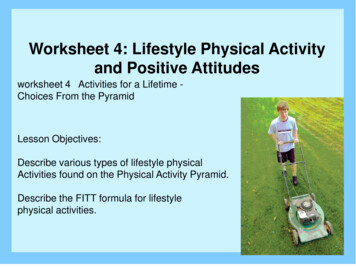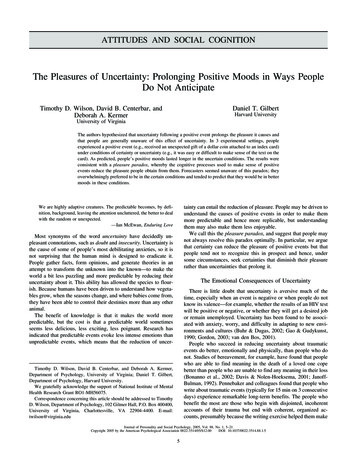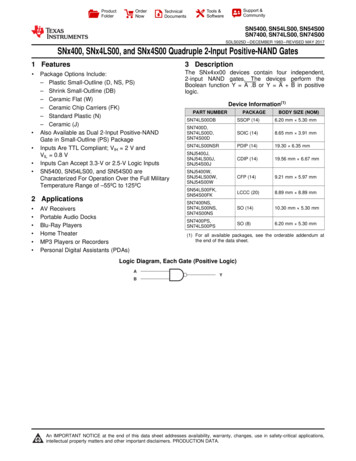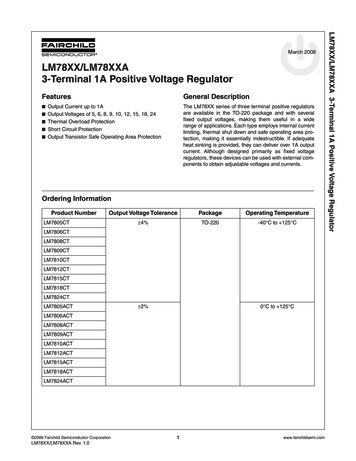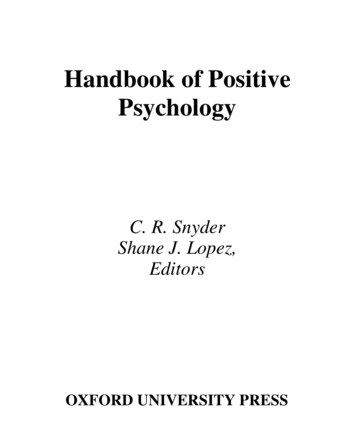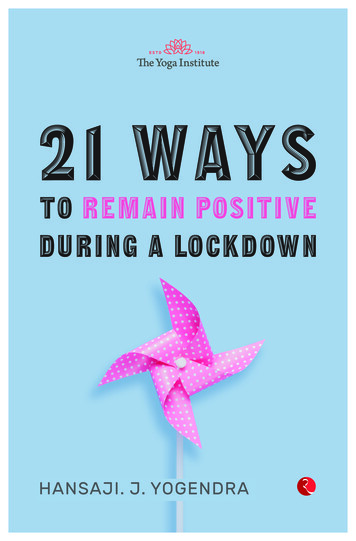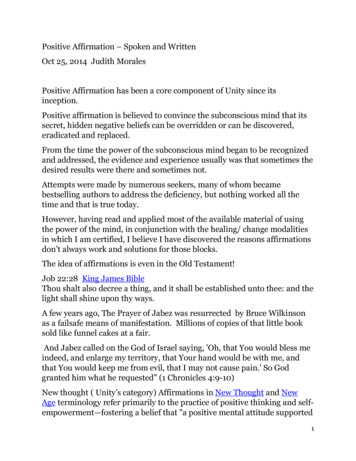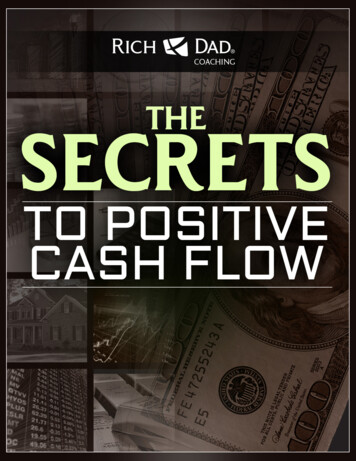
Transcription
The Secrets to Positive Cash FlowThe Secrets to Positive Cash FlowPositive cash flow—it is what separates assets from liabilities and makes your exitfrom the rat race possible. If you know how to create positive cash flow, you are onyour way to becoming rich. If you don’t or dismiss its importance, your investmentswill go south before you even know what has happened.When Robert Kiyosaki first disrupted the financial world back in 1997 with his book,Rich Dad, Poor Dad, he did so by asserting, “your house is NOT an asset.” He madethis bold statement because he understood the importance of positive cash flow andthe role it plays in creating true wealth.Receive 6 months of Rich DadCoaching Absolutely Free whenyou enroll in a new program andmention this offer!Just call 1-800-240-0434and mention extension 4159to receive this special offer.Assets put money into your pocket. Liabilities take money out of your pocket. It is assimple as that. The former represents your money working for you and the latter isyou working for money.Regardless of what people may call it, your house is a liability. Even if it is completelypaid for, when a house takes money out of your pocket for upkeep, taxes, andrepairs, it is moving you further away from exiting the Rat Race.The Rat Race is the all too familiar pattern of getting up, going to work, paying bills;getting up, going to work, paying bills. When you buy and own liabilities, instead ofassets, you have to work day after day, week after week, month after month to paythem off. Even then, they can still take money out of your pocket.Positive cash flow and assets, on the other hand, are what allow you to exit theRat Race.When you buy assets that produce positive cash flow, you begin to create true wealthfor yourself. That is because true wealth is not measured in terms of dollars, but interms of time. When your assets produce enough positive cash flow to cover all ofyour expenses, you never have to work again. You exit the Rat Race. Your assets—whether they be real estate, businesses, or paper assets—work around the clockputting money into your pocket.If you want Absolute Wealth, then you must understand and follow the secrets topositive cash flow. In the pages that follow, we’ll discuss the secrets that will help yousuccessfully approach investments in three of the most popular asset classes.The Secrets to Positive Real Estate Cash FlowReal estate investors are not cast from the same mold. While many people arecontent—or in some cases, resigned—to putting in their 40-hours week after weekafter week, real estate investors are a unique breed. They are willing to venture outon their own and take complete responsibility for their success and failure.2 2015 Professional Education InstituteCOACHING
The Secrets to Positive Cash FlowIn taking on that responsibility, the ones that really succeed are the ones that havelearned to think like the rich. They understand that breaking from the shackles of theE (Employee) and S (Self-Employed) quadrants necessitates a new way of thinking.The great thing, however, is that anyone can train himself or herself to think like asuccessful real estate investor.In this section, we explain five secrets to help you think about the art of real estateinvesting like those who have gone before you and successfully exited the Rat Race.Real Estate Secret #1 – Be Clear on What You Want to AccomplishReceive 6 months of Rich DadCoaching Absolutely Free whenyou enroll in a new program andmention this offer!Just call 1-800-240-0434and mention extension 4159to receive this special offer.More people know what they “don’t want” rather than what they “do want.”They know they don’t want to work for someone else. They know they don’t want tolive paycheck to paycheck. They know they don’t want to spend another day in theRat Race. However, when asked what they do want and how exactly they intend toget it, they only offer blank stares and shoulder shrugs.Successful real estate investors, on the other hand, know exactly what they want toaccomplish and how they are going to go about it.Instead of knowing they do not want to live paycheck to paycheck, they knowhow much money they need per month to cover their current expenses. Theyhave developed a detailed plan to generate that amount—and then some—over adefinitive timeframe through investing in a specific property type or types. In fact, theyhave determined the exact number of properties they will need to purchase. Theyalso know when and how they will roll their portfolio over into a larger cash flowingproperty that—according to their calculations—will produce enough passive cashflow to cover all their expenses. They can even show you the spreadsheets that mapout their anticipated cash flow on a monthly and yearly basis along with the numberof investment properties required to support those numbers.Now whether or not someone could accomplish this is beside the point. The point isthat there is a detailed plan. Maybe an assumption or two is off and it takes six yearsinstead of five. On the other hand, perhaps halfway into investing they learn how tocut their remodeling expenses, thereby increasing their cash flow, and are able to hitthe target in three and a half years. The plan evolves. It is fluid. As markets changeand education increases, the new reality is incorporated into the plan. Nevertheless,you can’t revise something you don’t have.So what is it EXACTLY that you want to accomplish in real estate? Do you know howmuch you need and how you will get it? How long will it take you to get there? Theanswers to these questions and a whole host of others are what you need to know ifyou are going to think like a successful investor.3 2015 Professional Education InstituteCOACHING
The Secrets to Positive Cash FlowReal Estate Secret #2 – Invest for Cash Flow, Not Capital GainsNot too long ago, you couldn’t turn on the television without seeing a show wherea couple of guys, a married couple, or whoever were buying a property for a steal,fixing it up, and selling it for huge profits (all in less than an hour).Now stop and think of how many shows there were where the star of the show wouldwalk out of the house to the mailbox, take out the rent checks, and walk back intothe house? Not exactly must-see-TV, but if this show was on, you would have abetter look into how a successful real estate investor thinks.Robert Kiyosaki has always extolled the virtues of investing for cash flow as opposedto capital gains. If a property happens to appreciate while you own it, great; however,if the sole reason you are purchasing a property is because you hope and pray thatthe value will go up, then you aren’t a true investor—you’re a gambler.Receive 6 months of Rich DadCoaching Absolutely Free whenyou enroll in a new program andmention this offer!Just call 1-800-240-0434and mention extension 4159to receive this special offer.A true investor understands that while the thrill of receiving tens of thousandsof dollars for a fix-and-flip may sound appealing, by selling the property, theyare cashing out an asset that can put money in their pocket for years to come.Appreciation is just the frosting but not the cake itself.One can look no farther than the recent crash to see the wisdom in investing for cashflow. When a property has a positive cash flow, the investor is covered. Regardlessof whether the value goes up or down, the positive cash flow is there to cover all thecosts and put money in the owner’s pocket. However, if an investment’s entire returnhinges on the price going up, what happens when the market goes down? Just askthe “investors” who lost everything when the real estate bubble burst.Real Estate Secret #3 – Hope for the Best, Plan for the WorstNo one ever invests with the intent to lose money. Unfortunately, it happens to eventhe best investors. The secret to putting the odds in your favor is learning how tominimize the potential risks that could derail your success. You do this throughconducting due diligence before you purchase any property.“Conducting due diligence” is a term that has been so overused that it has fallen intothe MBA-speak lexicon along with “creating a win-win,” “right-sizing,” and “thinkingoutside the box.” All that aside, it does not change the impact and necessity of theprocess. Thoroughly examining a potential investment will help minimize risks anddetermine whether an investment still makes sense for you.A beginning investor may naively think that as long as rents cover the debt services,then all is well. However, if vacancy rates, repair costs, replacement values, and anumber of other contingencies aren’t factored in to the final analysis, then an asset canquickly turn into a liability with the owner wondering, “Why didn’t I think of that earlier?”4 2015 Professional Education InstituteCOACHING
The Secrets to Positive Cash FlowThis goes beyond the financials too. For example, suppose an investor through ananalysis of the property’s financials determines that an investment will cash flow. Hecloses on the deal, has tenants lined up, and then finds out that according to theCC&Rs (Covenants, Conditions, and Restrictions) of the property, the homeowner’sassociation will not allow the property to be rented. What now?None of this is meant to scare anyone from investing in real estate, but to point outthe need to be thorough in evaluating a potential investment. Now, for some, theywill misinterpret this to thinking they need to know everything before they can invest.While a noble pursuit, it is completely unrealistic. For those who understand the RichDad philosophy, they will build a team of advisors who they can count on to ask themthe question, “Have you thought about this?”Receive 6 months of Rich DadCoaching Absolutely Free whenyou enroll in a new program andmention this offer!Just call 1-800-240-0434and mention extension 4159to receive this special offer.Real Estate Secret #4 – Know How to Attract and Retain TenantsHave you ever ridden in a friend’s brand new car and then got back in your car?What was your first thought? If you are like most people, it was, “My car sucks. Ineed a new car.” A car that seemed fine just moments ago is suddenly unacceptable.Why is that? The reason is you became aware of something better.So what does this have to do with investing in real estate? When it comes toattracting and retaining tenants, you need to make them aware of “something better.”Now before discussing this, please take this caveat to heart—improve yourproperties, but don’t OVER-improve your properties. While everyone loves granitecountertops, installing them in what will be a Section 8 rental is probably not yourbest investment of time and money.So where do you draw the line and what will give you the most bang for your buck?First, keep in mind that more often than not, you will be showing the property whenit is empty. This means that every chip in the paint or stain on the carpet will standout like a sore thumb. Consider repainting your property every time old tenantsmove out. This will provide a clean and fresh look to prospective renters. Now whilethere may not be a need to install new flooring with each tenant, objectively evaluatethe remaining life expectance of the flooring and at the very least have the carpetscleaned before showing the property.Another way to think when deciding what to replace or upgrade, is to consider theBroken Window theory. Social scientists James Q. Wilson and George L. Kelling, whofirst introduced the theory, put forth that a broken window left unattended increasesthe likelihood of additional windows being broken by vandals. If not corrected,eventually over time further vandalism escalates.Successful real estate investors follow the Broken Window theory, but in the reverse.They understand that a few upgrades on a property help tenants see the propertymore as a “home” instead of a place they are just renting. They become more5 2015 Professional Education InstituteCOACHING
The Secrets to Positive Cash Flowinclined to take a care of the property than they would if the property had discountappliances and builder-grade carpet. This in turn helps keep maintenance and repaircosts lower as well as increases how long tenants stay in the property.While there is no definitive answer to how much or how little to upgrade, you willneed to understand the rental market in your area and what is considered standard.By understanding your competition and listening to the feedback of prospectiverenters, you will get a good sense of what will help you attract and retain tenants.Real Estate Secret #5 – Always Be LookingSuccessful investors know that real estate is a numbers game—the more propertiesthey find, the more offers they submit; the more offers they submit, the more dealsthey will do; the more deals they do, the more money they make.Receive 6 months of Rich DadCoaching Absolutely Free whenyou enroll in a new program andmention this offer!Just call 1-800-240-0434and mention extension 4159to receive this special offer.In order to help get the numbers in your favor, you always have to be looking.However, you are only one person and regardless of how hard you work, you canonly cover so much ground. If you really want to expand your reach, you need toestablish multiple ways of finding opportunities. Better still, if you can set it up so theopportunities come to you, then you will be even more efficient. One way to haveopportunities come to you is by using a “birddog.”A birddog—when it comes to real estate investing—is just what the name implies: anindividual that hunts for and brings back investment opportunities.So who might be a birddog? Friends, family, neighbors, or co-workers might bepotential birddogs. Anyone who is out in residential neighborhoods on a regular basisis a good option too. Examples here would be mail carriers, pest control workers,home inspectors, landscapers, house cleaners/maids, companies tha
When Robert Kiyosaki fi rst disrupted the fi nancial world back in 1997 with his book, Rich Dad, Poor Dad, he did so by asserting, “your house is NOT an asset.” He made this bold statement because he understood the importance of positive cash fl ow and the role it plays in creating true wealth. Assets put money into your pocket. Liabilities take money out of your pocket. It is as simple .File Size: 851KBPage Count: 16
